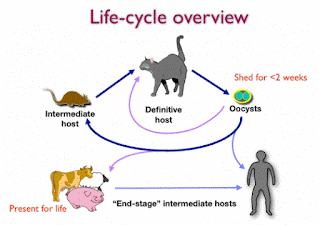We were recently asked about Toxoplasmosis and the dangers this protozoa poses to humans, particularly pregnant women. So, this month we are going to find out all about it and what precautions you need to take to keep yourself and your unborn baby safe!
And no, you don’t need to find a new home for your beloved cats!
Toxoplasmosis is a disease caused by Toxoplasma gondii, one of the most common protozoan parasites in the world. It is able to infect a wide range of hosts and different host cells.
To become infected with toxoplasmosis you must accidently eat the parasite!
THEREFORE, THE CHANCES OF BECOMING INFECTED WITH TOXOPLASMOSIS FROM EATING OR HANDLING RAW OR UNDERCOOKED PORK IS MUCH GREATER THAN YOU CONTRACTING IT FROM CAT FAECES!
Studies have shown that approximately 50% of humans infected with toxoplasmosis, contracted the disease through:
1. FOOD
2. ANIMAL TO HUMANS
As the definitive host, cats do play an important part in the life cycle of this protozoa. Cats become infected through hunting and eating infected rodents, birds and other small prey. Cats will then shed the oocyst stage of the protozoa in their faeces, therefore contaminating soil and/or litter boxes. To contract this disease via your cat you must:
Toxoplasmosis is a disease caused by Toxoplasma gondii, one of the most common protozoan parasites in the world. It is able to infect a wide range of hosts and different host cells.
To become infected with toxoplasmosis you must accidently eat the parasite!
THEREFORE, THE CHANCES OF BECOMING INFECTED WITH TOXOPLASMOSIS FROM EATING OR HANDLING RAW OR UNDERCOOKED PORK IS MUCH GREATER THAN YOU CONTRACTING IT FROM CAT FAECES!
Studies have shown that approximately 50% of humans infected with toxoplasmosis, contracted the disease through:
1. FOOD
- Eating raw, undercooked or contaminated meat such as pork, lamb or venison
- Accidental ingestion from not washing hands thoroughly after handling raw or undercooked meat.
- Eating food that has been in contact with contaminated utensils, knives or chopping boards.
2. ANIMAL TO HUMANS
As the definitive host, cats do play an important part in the life cycle of this protozoa. Cats become infected through hunting and eating infected rodents, birds and other small prey. Cats will then shed the oocyst stage of the protozoa in their faeces, therefore contaminating soil and/or litter boxes. To contract this disease via your cat you must:
- Accidentally ingest the oocysts after cleaning litter boxes
- Ingest anything that has come into contact with your cats faeces i.e.: cleaning out litter trays or gardening then eating or drinking without washing your hands first!
- Cats do not carry the parasite on their fur!
- Cats that spend their lives indoors are unlikely to carry toxoplasmosis unless they are fed infected meat.
- Cats seldom will get sick themselves when infected by the parasite but will shed it in their faeces when infected for the first time.
Generally speaking healthy people who become infected show no signs or symptoms. The few that do will present with flu like symptoms.
- Body aches
- Enlarged lymph nodes
- Headache
- Fever
- Fatigue
However, for those with weakened immune systems (e.g.; HIV/AIDS, cancer patients) it can cause serious complications. If you are pregnant and become infected it is possible to pass toxoplasmosis onto your unborn baby.
A SIMPLE BLOOD TEST CAN DETERMINE WHETHER YOU HAVE BEEN EXPOSED TO TOXOPLASMOSIS.
If you are thinking of starting a family it may be a good idea to discuss this with your doctor.
HOW CAN I PROTECT MYSELF FROM INFECTION?
PRACTICING GOOD HHYGIENEWHEN PREPARING AND HANDLING FOOD WILL HELP TO PROTECT YOU.
If you are healthy, once you have been infected with toxoplasmosis your immune system kicks in by keeping the parasites inactive and providing you with lifelong immunity.
TIPS:
- WASH HANDS BEFORE AND AFTER PREPARING FOOD
- Peel and wash fruits and veg before eating
- Ensure meat is cooked at a safe temperature and is not raw
- Avoid eating raw meat particularly if you are pregnant
- Wear gloves when gardening and cleaning litter trays .
- Clean litters trays often
- Or better still ask another family member to change the Litter box!
!WASH HANDS!



